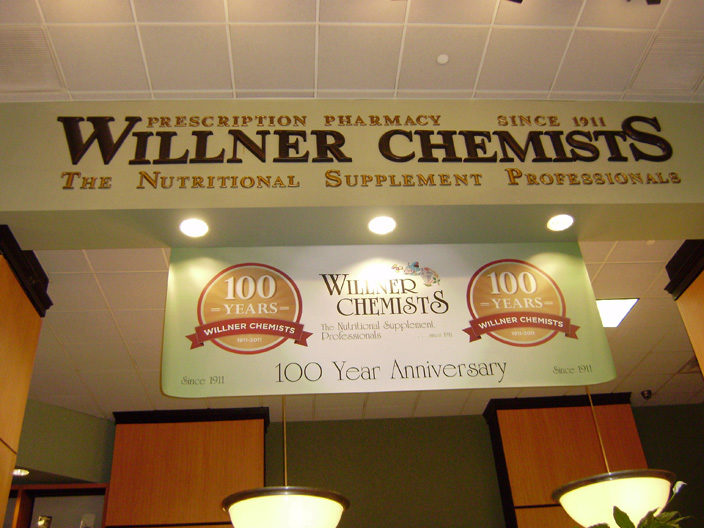“Welcome to The Willner Window, where we’ll look at nutritional herbs, supplements and homeopathy, what they are, what they do and how to properly use them.”
For more than a decade, this familiar introduction has greeted countless N.Y. -area listeners looking for honest, straightforward information about nutrition. This is no ordinary talk radio program. It’s a Sunday afternoon discussion centered on healthy living, straight from one of the nation’s oldest and most well-respected nutritional stores. The information shared by Arnie Gitomer, R.Ph., and Don Goldberg, R.Ph., owners of Willner Chemists, with both their radio audience and store clientele is built on a 100-year-old legacy of offering individuals the tools they need to lead the healthiest lives they can.
Transforming Willner’s
|
1. Willner Chemists displays its century long heritage over the store floor. 2. Willner Chemists has two New York City locations (the Park Avenue store is pictured here) and one Atlanta, GA store. 3. 100-year-old Willner Chemists offers 15,000+ SKUs. 4. Don Goldberg, R.Ph., and Arnie Gitomer, R.Ph., owners of Willner Chemists. |
Founded by Irving Willner in 1911, the original Willner Chemist store was your typical corner pharmacy where New Yorkers could order a soda from the fountain or ask the pharmacist questions about a prescription. Over the years, natural products legend Willner began stocking his own line of nutritional supplements and was instrumental in starting the movement toward sugar- and starch-free products. “It was the Willner Chemists supplement line that initially set Willner’s apart,” states Goldberg. “Doctors from all over the country were either dispensing the Willner line or sending their patients to Willner Chemists. Nutritional supplements eventually took over the shelves.”
Gitomer and Goldberg purchased the store in 1992 and under their leadership, the product mix has expanded and the business has flourished. “We totally changed direction as far as the Willner product line was concerned. We gradually discontinued more than 90% of the Willner line, and increased our inventory of products from other companies,” Goldberg explains. Today, Willner Chemists is a hotspot for buying dietary suppleme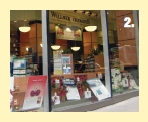 nts, herbal supplements, homeopathic remedies and natural personal care products. Over the years, the footprint expanded, too. Willner Chemists now has two New York City locations; the main store is located on Park Avenue a stone’s throw away from Grand Central Station and the other is downtown on Broadway near City Hall. The third store is located in Atlanta, GA.
nts, herbal supplements, homeopathic remedies and natural personal care products. Over the years, the footprint expanded, too. Willner Chemists now has two New York City locations; the main store is located on Park Avenue a stone’s throw away from Grand Central Station and the other is downtown on Broadway near City Hall. The third store is located in Atlanta, GA.
Upon becoming the new owners of Willner Chemists, Gitomer and Goldberg wasted no time in making some significant changes to the business. The first was modernization. “When Don and I bought the store in 1992, it didn’t have a fax machine, a copier or a computer,” Gitomer reminisces. “The first thing we did was sort of modernize a little bit.” Not long after purchasing the store, new computer and phone systems were installed.
Today, the store has an informative Web site, complete with a library of nutritional information, the store’s sales flyer, an online ordering system and links to Willner’s radio shows. Says Goldberg, “We try to make it a place for our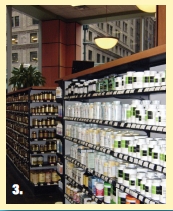 customers to go to get information.”
customers to go to get information.”
Goldberg also has a blog (www.dongoldberg.com), where he addresses questions from the community. He has talked about whether or not to take iron supplements, explained the differences between supplements bought at a natural products store versus a grocery store, and even blogged about current events like the changing recommendations for vitamin D.
The blog is a great tool for Willner’s. It facilitates a give-and-take of information from which an entire community can benefit. Plus, it helps to establish the store as an authority on nutritional supplements. “I felt it was a better way for me to interact more directly with the consumer, and do so in a less formal, less restrained manner,” says Goldberg.
Gitomer, too, is plugged into clients via e-mail. “People love to receive free information this way, especially medical information. They love it,” he says, adding that in the future, the store may dabble in social media sites, too.
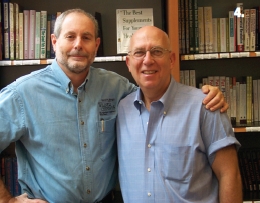 Another big change for Willner Chemists was to publish and mail a catalog filled with the store’s inventory and discount prices. To date, the store mails 75,000–80,000 catalogs to customers four times a year. Some stores may have dropped this service in the digital age, but at Willner’s, it’s about knowing the customer and filling his/her needs (more on this important philosophy later).
Another big change for Willner Chemists was to publish and mail a catalog filled with the store’s inventory and discount prices. To date, the store mails 75,000–80,000 catalogs to customers four times a year. Some stores may have dropped this service in the digital age, but at Willner’s, it’s about knowing the customer and filling his/her needs (more on this important philosophy later).
A Window into Willner’s Education
Not long after the pair bought Willner’s, Gitomer and Goldberg started a radio show called “The Willner Window”, hosted today on WOR, New York’s oldest, privately owned radio station and the country’s top talk radio station. States Goldberg, “We had never done radio before, but it turned out great, and everybody loved it.”
The program exemplifies one of the things that Willner’s does best: education. The show has two formats, either a guest interview or a topic discussion. “We’ll talk about osteoporosis or joint health or we’ll talk about intestinal health or immune support or the flu. And, we’ll open up the phones and let people call in,” says Gitomer.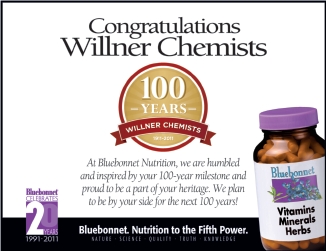
Audience members range from well-versed nutrition enthusiasts to those just looking for whatever health advice they can get. Both with a background in pharmacy, Gitomer and Goldberg subscribe to the philosophy that “There’s a time for natural remedies and there’s a time for medicine. In acute situations, very often medication is what you need,” says Gitomer. At other times, clients may be best served by trying a nutritional supplement.
The point is to open up Willner’s as a go-to source of reliable information about health, and Gitomer and Goldberg have worked hard to make this happen. “That’s what we do here,” says Gitomer. “Someone comes in and says, ‘I don’t know what to take. I heard about CoQ10, fish oil and green foods.’ How do I put it all together?” Willner’s aims to offer the know-how and the tools to help shoppers do just that.
Further establishing themselves as nutrition authorities, the pair (in conjunction with Robert Abel, Jr., M.D.) co-wrote a 300-page book entitled, The Best Supplements for Your Health. Says Gitomer, “It offers everything you wanted to  know about supplements, but didn’t know who to ask.”
know about supplements, but didn’t know who to ask.”
In order to offer such information in stores, the current Willner’s team is staffed with numerous pharmacists, nutritionists and well-trained sales-support personnel. Getting a job with this supplements store is no easy feat. “A lot of the people we hire have previously worked in retail,” says Gitomer. And no matter how busy things get, “I interview all of them. I make sure they understand nutrition,” he states.
Your average Joe—and maybe even your standard Sally with an interest in nutrition—would have trouble passing the Willner’s interview. Gitomer questions aspiring Willner’s employees about how one would tell a natural vitamin E ingredient from a synthetic; the difference between an omega-3 fatty acid and an omega-6 fatty acid and their sources; the benefits of specific supplements like CoQ10; what distinguishes vitamin D2 from vitamin D3; and the list goes on.
To Gitomer, these questions are simple. “If they don’t know the answers to these, they’re not going to know ab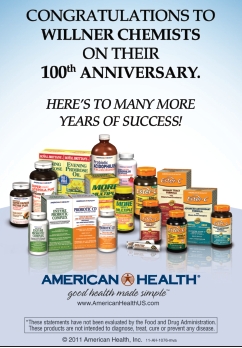 out anything else. That’s the entrance exam ,” he states.
out anything else. That’s the entrance exam ,” he states.
For current staffers, Gitomer and Golberg regularly book training sessions with their product manufacturers. “Almost every week, a company will come in and go over their products,” Gitomer explains. He, himself, keeps up-to-date on nutritional information and the supplements industry by reading trade publications, attending tradeshows like Natural Products Expo West and reading content from esteemed medical journals.
Putting the effort into finding and cultivating such nutrition-knowledgeable staff members is time well spent, Gitomer feels. He believes the only way to maintain the Willner experience—complete with education at the ready—is to have high-caliber, well-informed staff members, not disinterested personnel looking for summer hours. “You go into some stores and who’s there? If you want legitimate information, go to Willner’s,” says Gitomer.
Goldberg agrees that it’s imperative to have a staff of knowledgeable pharmacists and nutritionists on hand to answer everyone’s question—despite the price tag the store pays for their expertise. “Our payroll is probably one of the highest of any retail ‘health food store,’” he says. “But again, that’s what we are all about, and if it means slightly smaller margins, we are willing to pay that price.”
This wasn’t always the case at Willner Chemists. Before Gitomer and Goldberg took over the business, the store was a completely different place. “In the original store, customers would walk around, pick out their products and be on their way. No one from the store was very helpful. We spruced it up,” Gitomer states.
That brings us to another important aspect of the Willner’s experience: the personal touch.
to another important aspect of the Willner’s experience: the personal touch.
Knowing Your Customers
Gitomer and Goldberg take pride in the fact that their professional staff helps pull together nutritional supplements into a program that makes sense for each individual. “Whatever it is, we try to gear something to each person,” Gitomer states.
Being able to target these needs is perhaps one of Gitomer’s greatest strengths as a retailer, and an attribute that is by no means a given in the world of sales. “I know my customers,” he states. “If someone walks in and starts asking questions, I can size them up nutritionally. I’ll have a way of feeling out what they really want.”
Even in a place as large as New York City, with stores located in hotbeds of commuters and visitors, “I know many customers by name,” he states. This personal touch has lead to a landslide of repeat visitors. “We have groupies,”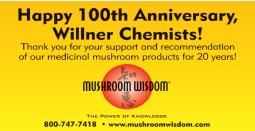 Gitomer jokes.
Gitomer jokes.
He characterizes the store’s main clientele as baby boomers and older. Gitomer has zeroed in on what his shoppers are looking for: authoritative information from a trustworthy store. Plus, they like to have it delivered via traditional means.
Remember the Willner’s paper catalog? Gitomer says his customers, by and large, are not digital fanatics. “These are people who are very happy to have something in hand to look at,” he states. So rather than pushing them into a sales tool that would be more modern (and cheaper for the store to disseminate), Willner’s is sticking with what works for its clients: a paper catalog.
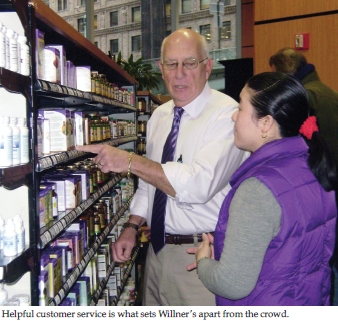 He also states that Willner Chemists has sponsored seminars, too. Though the radio program has a large reach, Willner’s shoppers still enjoy in-person discussions with guest experts. For instance, Gitomer notes that the store recently held a luncheon lecture with supplements manufacturer Solgar Vitamin and Herb for his shoppers.
He also states that Willner Chemists has sponsored seminars, too. Though the radio program has a large reach, Willner’s shoppers still enjoy in-person discussions with guest experts. For instance, Gitomer notes that the store recently held a luncheon lecture with supplements manufacturer Solgar Vitamin and Herb for his shoppers.
“In addition to doing all these nice things and helping people, we also offer very good prices. We try to do everything on a day-to-day 20% off discount and also have special sales,” Gitomer adds. This, he says, drives store and mail order traffic.
Getting into Willner’s
Willner Chemists offers 15,000+ SKUs packed on well-organized shelves. Despite the sophisticated, open feel of its Park Avenue store, there’s not a lot of extra room to play with. After all, real estate, especially in this pricey part of town, comes at a premium. Therefore, Gitomer and Goldberg must be choosey about which brands it sells—especially when new lines are pitched. This may be quite different from other stores that “go off on every little hot thing,” Gitomer states.
Adds Gitomer, “We do not tout every new supplement fad that comes along. We try to provide factual information about supplements, even if it means we miss out on the opportunity to sell tons of the latest miracle cure. I may make less money, but I sleep better at night.”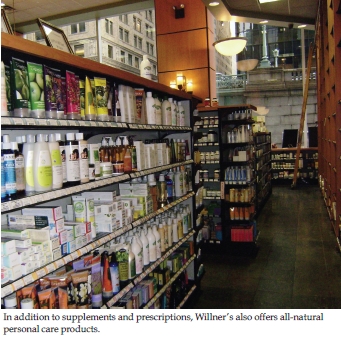
To impress Gitomer and Goldberg, supplements must be labeled properly and the formula must make sense in terms of safety, quality and efficacy. Visits to product manufacturing sites are regular practice, too. “My background is in quality control. Arnie and I both know what questions to ask and what to look for when we inspect a facility…we try to confirm that they are following good manufacturing practices, and producing a quality product,” says Goldberg.
There’s also an in-depth label inspection to recognize any potential problems with the product. Says Goldberg, “If the label is inaccurate or misleading, that is an indication of problems with what is inside the bottle. We ask about expiration dates and stability testing. We try to look past the marketing fluff.”
Beyond that, Gitomer states, “Manufacturers need to promote their products to shoppers. If you aren’t promoting it, I can put a few products on the shelf, you could come back in a month and they would still be there.” It’s important to get the word out to shoppers about what makes a supplement worth buying, he feels.
 His rationale for being so selective is that selling a new item means taking something else off the shelf. Gitomer says he’d bring on something new if several clients requested it, but not as easily if just one supplement marketer did so.
His rationale for being so selective is that selling a new item means taking something else off the shelf. Gitomer says he’d bring on something new if several clients requested it, but not as easily if just one supplement marketer did so.
In the end, what has made Willner Chemists a success is having a deep understanding of its unique New York City clientele, and giving shoppers exactly what they want: “We just try and offer people good products and good prices and give them the information they need about the products they’re buying,” states Gitomer.
This philosophy will surely continue to make Willner Chemists a top nutritional supplements retailer for many, many years to come. WF
Published in WholeFoods Magazine, June 2011

